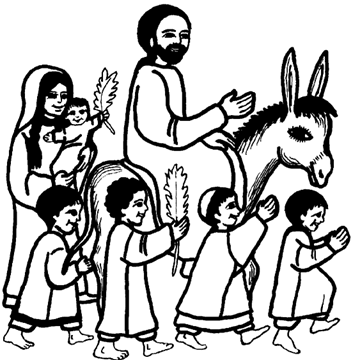Rev Alison Way
Matthew 21:1-11 and Philippians 2:5-11
God, Father, Son and Holy Spirit, grow in us the fruit of your spirit, love, joy, peace, patience, kindness generosity, faithfulness, gentleness and self control. Amen
Today in our consideration of the fruit of the Spirit that St Paul describes in his letter to the Galatians, we are briefly thinking about Generosity. Generosity is giving good things to others freely and abundantly. Generous behaviours are intended to enhance the well-being of others.
This is one of the fruit where the translation most commonly varies in some versions of the Bible generosity and in others goodness, but we can see that being generous is pretty synonymous with being or doing good. In the picture book we therefore have the apple of goodness – helps us to be and do good as we should!
Jesus regularly acted with great generosity of heart in the way he approached his day to day life
- the enormous quantity of wine he made at the wedding feast in Cana,
- or the vast amount of food available at the feeding of the five thousand.
The generosity factor is something that I often use in discernment of the right course of action in the face of a dilemma. If it is honouring of God’s love for us, then we need to give a generous response. I am not saying that is always easy, but I often sit more comfortably with a difficult choice if I have been gracious and generous! It is best for us to share what we have, but like all small children when they first learn this art, that means we need to open ourselves up to considering others needs on an equal footing to our own.
In our first reading we heard about the crowds welcoming Jesus warmly into Jerusalem. The crowd responded in 2 different ways – some cut palm branches to wave and others laid their cloaks on the ground. If we like the palm branches were free and freely available – This was an easy choice of no cost to those who chose to wave the palms. But laying your cloak on the ground was a much more costly way to honour Jesus. Cloaks were valuable, and useful and put to all sorts of purposes in everyday life. Opening a cloak to the potential for dirt and damage like this was the much more generous response to Jesus coming!
I am not sure quite what was going on in the hearts of the people of Jerusalem on the first Palm Sunday – the reading describes the situation as turmoil, and the crowd recognising Jesus as a prophet from Nazareth in Galilee. Yet the words of the crowd as he rode on the donkey, recognised he was so much more than this – he was the one to who the crowd cried Hosanna (which means save me), and son of David – which was a very respectful address of his lineage, credentials and recognising he was coming in the name of the Lord.
Though the crowd soon turned on him, the echoes of who he was and what he came to do are there even if they didn’t understand it completely.
So this holy week which starts today, and as we mark once again the cross and passion of our Lord Jesus Christ, in the horns of any dilemma presented to us, let’s use generosity as a litmus test. In the choice of responses we have, which is the most generous and choose that. We are acting in this way to show how the Holy Spirit can grow generosity into us in response to Jesus overwhelmingly generous love for us.
On Good Friday we will think in depth about the cross and the reality for Jesus and his love for us. That powerful phrase from our reading from Philippians tunes into this.
Jesus being found in human form, he humbled himself and became obedient to the point of death – even death on a cross.
This is a very big deal for us, and one that changed things for ever and shows the ultimate generosity of God, through the Father and the Son and bringing to us the Holy Spirit to guide us. We recognise this huge act of love changed everything. We should exalt and proclaim the name of Jesus as our loving Lord and be generous in all things.
Amen
The New Revised Standard Version of the Bible © 1989, 1995. Picture from rootsontheweb.com © reproduced with permission. https://generosityforlife.org/definitions-of-generosity/#:~:text=%E2%80%9CGenerosity%20is%20giving%20good%20things,through%20various%20forms%20of%20giving.
The Fruit of the Spirit for little ones – Mandy Fender




